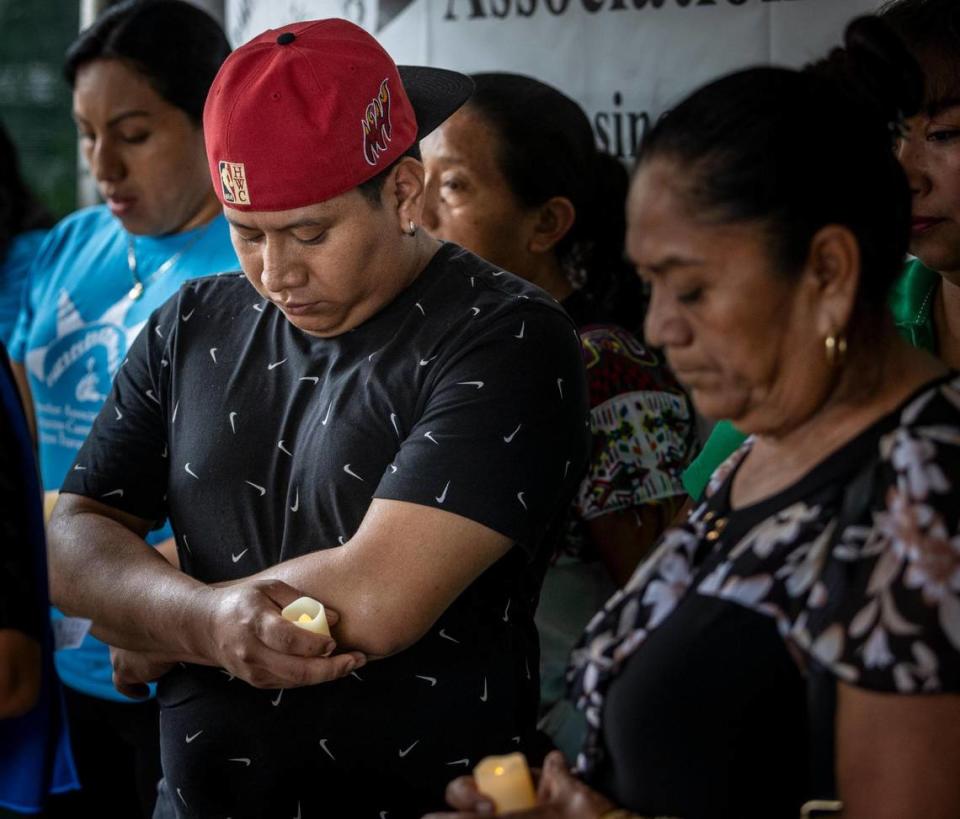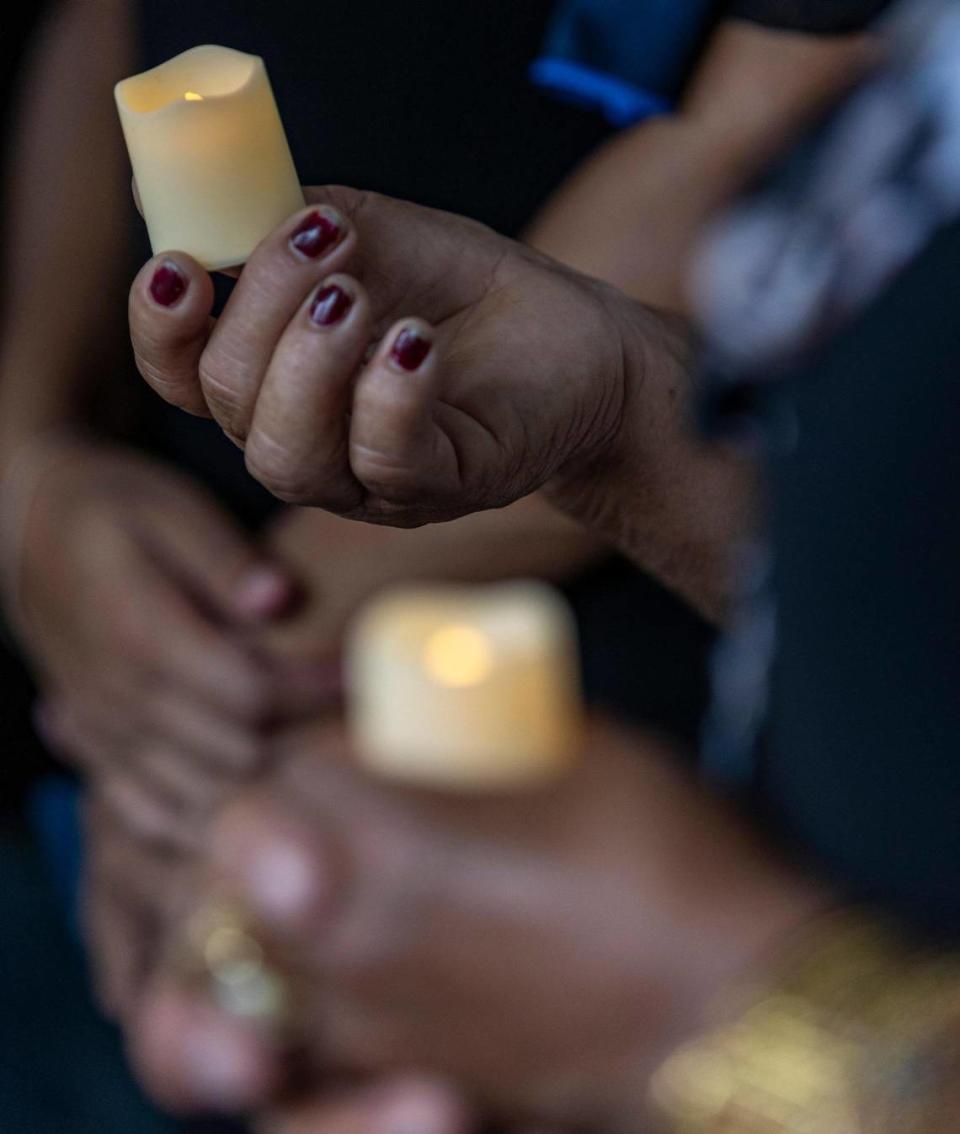Calls for change after Florida farmworker, 29, dies in heat. ‘Is that what we deserve?’
Efraín López García survived eight sweltering summers as a farmworker in Homestead. But on July 6 — the hottest day recorded on earth since at least 1979 — López García died on the job.
López García, 29, is the second farmworker known to die in a South Florida field this year. His death earlier this month has become the latest rallying cry for workers pushing Miami-Dade County to pass a law that would require minimum workplace protections for people working outside on the hottest days of the summer.
“On July 6 in Homestead, a 29-year-old kid died in the heat,” said Alejandro Pérez, a member of the worker advocacy group WeCount, at a press conference outside the county commission chamber on Tuesday. “Is that what we deserve? No. We’re human beings. We deserve a dignified life and a decent job. Today we want to tell the commissioners to pass this law so that we can stop our people from dying.”
Around midday on July 6, López García told his coworkers, including his cousin, José García, that he didn’t feel well. The workers weren’t sure what to do. Their bosses, they said, had never trained them on how to recognize the signs of heat stroke or administer first aid in an emergency.
So they did what they could. López García’s coworkers led him to a shady spot in the grove where they had been picking longan, a tropical fruit related to lychee, and sat him down. They said they gave him water and left him there to rest. But it was too late. When José came back to check on his cousin, Efraín was gone.
He had stood up, disoriented, and wandered off. José found Efraín several yards away lying on his stomach. A medical examiner’s report is pending, but family and coworkers say all the evidence points to the sweltering working conditions as the cause.
A coworker called Efraín’s brother, Jeremías López García, in Jacksonville to break the news. “He told me something had happened but he didn’t say what exactly,” Jeremías said at a vigil for his brother held Wednesday at the Homestead office of the Farmworker Association of Florida. “I called him back and talked to him and he told me [Efraín] was ill and had apparently died because of the heat.”

Earlier this year, another unnamed farmworker was found lying in a drainage ditch at C.W. Hendrix Farms in Parkland, killed by a heatstroke.
Heat kills 34 people a year in Miami-Dade County, on average. On Tuesday, Miami-Dade County commissioners Kione McGhee and Marleine Bastien introduced a bill designed to protect outdoor workers on hot days. It would require companies to train workers on heat safety and guarantee them access to water and regular breaks in the shade throughout the day.
On hot days, like July 6, the bill would require companies to make sure no worker is left alone — and to provide first aid and call 911 if a worker shows severe symptoms of heat stroke.
The goal: water, shade, breaks
“All of this could have been prevented with the right legislation,” said Yvette Cruz, a spokesperson for the Farmworker Association of Florida. “All we ask is for four basic things: water, shade, breaks and to work with somebody — not to be left alone.”
Like many of the agricultural workers in South Miami-Dade County, Efraín López García came to the U.S. from Guatemala. He arrived in 2014 and worked in farms and nurseries in Homestead ever since. His brother Jeremías remembers him as someone who was “very friendly, fun, a good person.” He liked to spend his time off work at the beach.
Efraín has a brother and sister who live in Homestead, and his brother Jeremías lives in Jacksonville. His mother still lives in Guatemala. “We’re sad, those of us here and the family in Guatemala,” Jeremías said. “We’re desperate to see the body.”
The family has started a GoFundMe page to raise the money to send Efraín’s body to Guatemala, to have a funeral with his mom and extended family.
Punishing heat for outdoor workers
López García, like the rest of Miami-Dade County’s over 300,000 outdoor workers, had been laboring outside during a record-breaking stretch of hot days when he died.
Since June 12, the county’s heat index — a measure of heat and humidity that tells you how hot it feels in the shade — has risen above 100 degrees for 37 straight days. Shortly before López García’s death on July 6, the county began a still-unbroken 16-day stretch in which the National Weather Service has issued a heat advisory every single day.

Under heat advisories, the National Weather Service advises that people stay indoors, avoid strenuous activities, drink plenty of water and rest as much as possible. But for farmworkers like López García, that isn’t always possible.
This summer — the hottest ever recorded in Miami — has been a preview of summers to come in South Florida, as the region’s hottest days become more common thanks to climate change.
Undocumented workers are most at risk
Like many South Florida farmworkers, López García didn’t speak Spanish as a first language; he spoke an indigenous Guatemalan language called Mam. That makes it harder for workers to advocate for themselves on the job or seek help even from Spanish-speaking aid organizations.
And, like many farmworkers, López García often got paid under the table in cash to avoid documenting his employment, said Claudia Gonzalez of the Farmworker Association of Florida. In June, the Florida legislature passed a law that would punish companies for hiring undocumented immigrants. The Farmworker Association of Florida says laws like this discourage workers from asking for basic needs for fear of drawing attention to themselves and being fired or deported.
“In South Florida, workers are scared to speak up when they’re under attack from anti-immigrant laws,” said Sonia Moreno of the Florida Immigrant Coalition. “As a result, the most vulnerable communities are scared to even ask for a break to go to the bathroom or drink water because they’re afraid of being marginalized because of their immigration status.”

López García died at the Ba 9 Vuon Trai Cay farm in Homestead, according to the Farmworker Association of Florida. But Thang Dang, the farm’s owner, told The Miami Herald on Wednesday that Lopez García never worked there. “My business has nothing to do with the guy who died,” he said.
It’s not exactly clear how much water he had or how many breaks he took. And coworkers did say that supervisors told López García to go home for the day when he said he was feeling ill. But he stayed on the job anyway.
“Although they did tell him he could go home and he could rest, when you’re a farmworker you don’t feel like you can take the privilege of going home and missing out on that day’s work and not having that money coming in for that day,” said Elena Contreras with the Farmworker Association of Florida. “He must have been scared. He must have wanted to continue working. And unfortunately we lost him because of that.”
Farmworker deaths are likely undercounted
Although López García’s coworkers say the heat killed him, the family is still waiting on a report from the county medical examiner to determine his cause of death.
Heat deaths among outdoor workers are likely undercounted. “I think it’s grossly underreported,” said Doug Casa, who heads research on heat illness at the University of Connecticut’s Korey Stringer Institute. “Laboring in the heat is one of the main reasons to have cardiac events…When a worker dies in the heat of a cardiac event, it’s getting recorded as a cardiac event, it’s not going down as the heat that caused it.”
“If a person’s not a U.S. citizen or they’re working here illegally, we’ll basically never hear about those cases,” Casa added.
This climate report is funded by Florida International University, the Knight Foundation and the David and Christina Martin Family Foundation in partnership with Journalism Funding Partners. The Miami Herald retains editorial control of all content.

